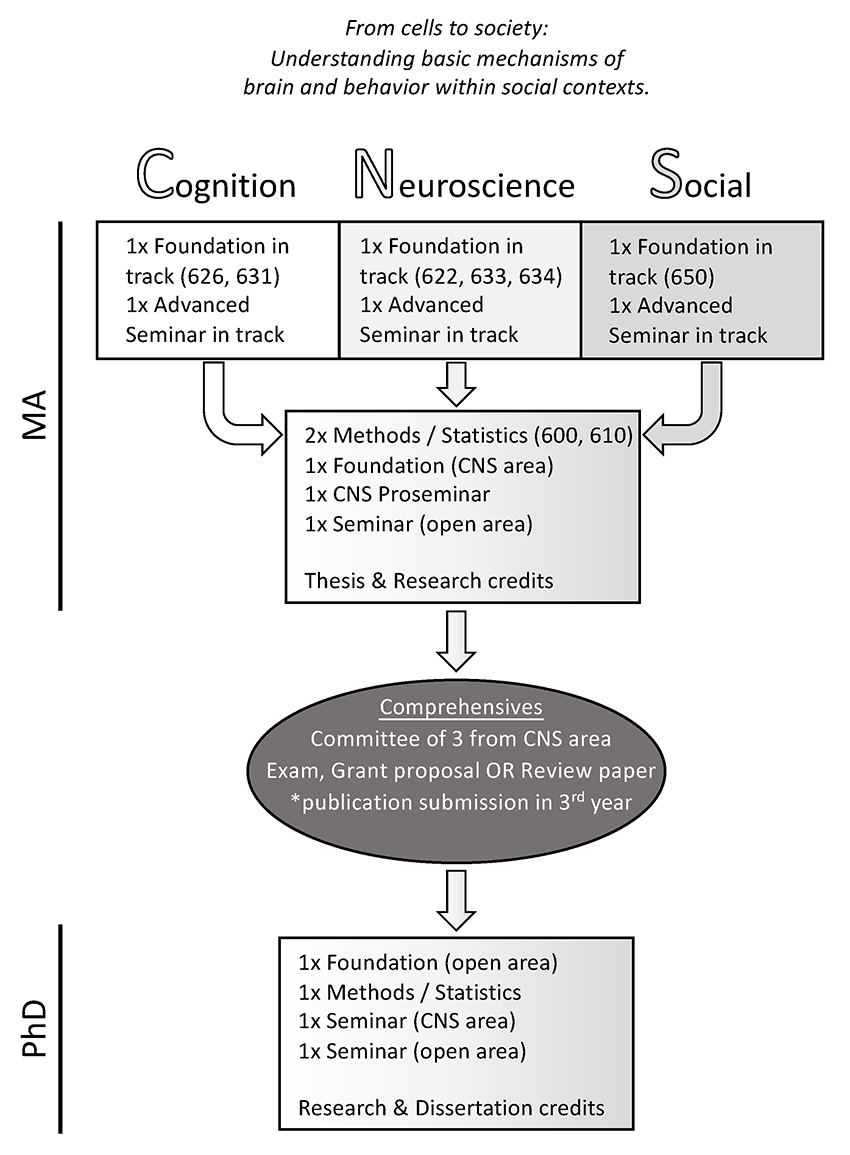Cognition, Neuroscience, and Social Program
From cells to society: Understanding basic mechanisms of brain and behavior within social contexts.
The Cognition, Neuroscience, and Social Program Area Faculty planning to
recruit and mentor new graduate students for admission to the Fall 2025 program are
Kristin Pauker, Joni Sasaki, Scott Sinnett, Sai Auelua-Toomey, and Jonas Vibell.
Carefully review: Prospective Student Information | Applications and Admissions
The Cognition, Neuroscience, & Social (CNS) program conducts cutting edge research on human behavior that ranges from the level of cells to society, exploring the mechanisms of brain and behavior within social contexts. To explore many of the fascinating questions in these areas, faculty members and graduate students use a variety of experimental approaches such as behavioral studies, psychophysics, computational models, eye-tracking and motion tracking in virtual reality, electroencephalography (EEG), functional Magnetic Resonance Imaging (fMRI), as well as developmental, genetic, and animal research approaches. CNS graduate students receive interdisciplinary training across the three areas, and participate and lead ongoing and novel research projects. Generally, students are mentored by a faculty member with expertise in either cognition, neuroscience, or social psychology, although across discipline research and mentorship is available. The CNS program is comprised of faculty members conducting research in the following areas:
- Cognition: Human cognition spans a wide array of topics, including basic cognitive mechanisms such as perception, attention, memory, thought, and reasoning, as well as both the development of human cognition and how it might be modulated by social interactions. Our current research focuses on exploring the cognitive and neurological mechanisms that support human and non-human animal cognition, with emphasis placed on mechanisms of attention, perception, and memory, both within and across sensory modalities, and measured in both neurotypical and atypical populations.
- Behavioral Neuroscience: Research in the behavioral neurosciences emphasizes a research intensive, multi-disciplinary approach to the analysis of behavior from psychological and neurobiological perspectives. The program prepares students for research and teaching in behavioral neuroscience by providing broad training in modern and traditional methods and theories. Our current research focuses on comparative cognition and the neurobiology of emotion, stress, learning, and memory
- Social: This is the branch of psychology that studies individuals in the social context. It explores how and why people think, feel, and do the things they do depending upon the situation they are in. Our current research focuses on generating and testing theories of social behavior that aim to illuminate many aspects of the human experience, including interpersonal relationships, prejudice and stereotyping, person perception, biases in judgment, emotion, cultural influences in thinking, helping and aggression, identity and the self, and attitudes and persuasion.
NOTE: Graduate students engage in research from their first semester with their faculty supervisor(s) and complete a basic core of required and elective courses in Psychology during their first two years. Prospective graduate students are strongly encouraged to contact faculty members in the CNS program to explore training and research opportunities.
CNS Curriculum
Students in the CNS program work with an advisor in either the C, N, or S track (with co-mentorship opportunities available). The following details all degree requirements at the MA and PhD levels:
All MA students are required to take:
- PSY 600: Methodologic Foundations of Psychology
- PSY 610: Introduction to Regression
- PSY Foundation (any CNS foundation)
- PSY CNS Proseminar (e.g., 721, 731, 751)
- PSY Seminar (open area)
- Additional Research and Thesis credits (PSY 729, 739, 759, 700)
Depending on track, MA students are also required to take:
- Cognition: PSY Foundation (626 or 631) and PSY Seminar (721)
- Neuroscience: PSY Foundation (622 or 634) and PSY Seminar (731)
- Social: PSY Foundation (650) and PSY Seminar (751)
All PhD students are required to take:
- PSY Foundation (open area)
- PSY methods/statistics
- PSY Seminar (CNS area)
- PSY Seminar (Open area)
- Additional Research and Dissertation credits (PSY 729, 739, 759, 800)
Comprehensive Exam
- Students will have one year to complete the comprehensive exam after defending their MA theses and before proposing their dissertation.
- Three readers from the CNS program are required to evaluate the comprehensive exam.
- Please see Comprehensive Exam Guidelines for specific requirements regarding proposing and completing the comprehensive exam.
Three formats of comprehensive exam:
- Traditional Exam: Students will answer three questions designed to test their knowledge of their area.
- Grant proposal + breadth question: Students will develop and submit to their comprehensive exam committee a grant proposal and will answer one breadth question.
- Review paper + breadth question: Students will develop a review paper in their area and submit it to their comprehensive exam committee and will answer one breadth question.
Additional Requirements
All CNS students are required to submit at least one manuscript for publication by the end of their 3rd year

Cognition, Neuroscience, & Social Program Example Schedule (Cognition Track)
| First Year – Fall |
|---|
| PSY 610: Introduction to Regression (3) |
| PSY 626: Cognitive Psychology (Cognitive Track) (3) |
| PSY XXX: CNS Proseminar (3) |
| PSY 729: Research in Cognitive Psychology (3) |
| First Year – Spring |
| PSY 600: Methodological Foundations of Psychology (3) |
| PSY 721/731/751: Seminar – Open area (3) |
| PSY Foundation: Open area (622, 631, 634, 650) (3) |
| PSY 729: Research in Cognitive Psychology (3) |
| Second Year – Fall |
| PSY 721: Advanced seminar in Cognitive Psychology (3) |
| PSY 729: Research in Cognitive Psychology (3) |
| PSY 700: Thesis (proposal) (3) |
| Second Year - Spring |
| PSY 721: Advanced seminar in Cognitive Psychology (3) |
| PSY 729: Research in Cognitive Psychology (3) |
| PSY 700: Thesis (defense) (3) |
| Third Year – Fall |
| PSY Foundation: Open area (622, 631, 634, 650) (3) |
| PSY 6XX: Methods/Statistics (3) |
| PSY 729: Research in Cognitive Psychology (Comprehensive exams time slot option 1) (3) |
| Third Year – Spring |
| PSY Seminar: CNS area (721, 731, 751) (3) |
| PSY Seminar: Open area (CNS or CCD courses) (3) |
| PSY 729: Research in Cognitive Psychology (comprehensive exams time slot option 2) (3) |
| Fourth Year – Fall |
| PSY 800: Dissertation Proposal (3) |
| Fourth Year - Spring |
| PSY 800: Dissertation Defense (3) |

Program Area Faculty
- Sai Auelua-Toomey
- Patricia Couvillon
- Kentaro Hayashi
- Kristin Pauker
- Joni Sasaki
- Scott Sinnett
- Lorey Takahashi
- Jonas Vibell
Emeritus Faculty
- Adrian Dunn
- Catherine Sophian
- Elaine Hatfield
- Caroline Blanchard